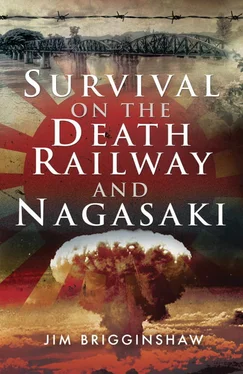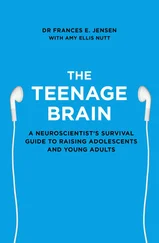Tension mounted among the Japanese. Whenever an air-raid siren sounded, the town population took off for the hills and the guards dived into trenches dug close to the compound.
Despite the unrest, the prisoners’ routine was maintained. They still went down the mine as usual.
On 9 August 1945, the men working deep underground felt the earth tremble violently. Chunks of rock from the roof above their heads broke away and crashed down.
‘It’s an earthquake!’ somebody yelled in panic. ‘The mine’s caving in!’
The men huddled in their cramped space and waited for the worst, but they weren’t destined to die, not then. The earth settled, the danger passed and work resumed at the coalface. It was just another incident in their ever-hazardous days, and they put it out of their minds.
However, when the shift finished and they returned to the surface, they found Japanese guards and civilians rushing about in a state of panic.
‘What’s happened?’ Bodero asked a no-duty prisoner who’d been in camp that day.
‘Nobody knows,’ the man said shakily. ‘Over behind those mountains to the north, towards Nagasaki, the whole bloody sky lit up in a blinding flash. There was a hell of a blast and a shock wave hit us like a tornado. Even the ground shook. How this place is still standing beats me. At first we thought it was an earthquake.’
‘We felt it a mile underground’, Bodero told him. ‘We thought it was an earthquake too.’
The no-duty man shook his head. ‘No earthquake sends up a weird cloud like that. You should have seen the bloody thing. You’d swear it was a giant mushroom. It must have swirled up into the sky for miles.
I tell you, mate, it was bloody terrifying.’
The man continued to insist that it wasn’t an earthquake. ‘The Japs are used to quakes, but this frightened the shit out of them. They’ve been running around like chooks with their heads cut off. I think they know something they won’t tell us.’
‘What do you reckon, Jim?’ Fred asked when the man left.
Jim speculated that it could have been the oil storage tanks over near Nagasaki. ‘I reckon they’ve been bombed and set on fire.’
‘What about the blinding flash that bloke talked about? And the mushroom cloud he said rose for miles?’
Jim shrugged. ‘Beats me. Could be some new high-explosive bomb the Yanks used on the tanks.’
‘Some bloody bomb’, Fred murmured.
That night, word raced around the camp after one of the Japanese guards let drop that the blast had indeed been a new high-explosive American weapon.
The news came in bits and pieces. It said that an atomic bomb had been dropped on Nagasaki, a bomb of such power it had completely obliterated a third of the large city and killed countless thousands of men, women and children.
Then came further news that three days earlier, a similar bomb had been dropped on Hiroshima, causing even worse devastation. Almost no one had survived.
What was an atomic bomb? The prisoners had no idea. Even when the more scientific-minded among them talked about the immense power that could be unleashed by splitting the atom, it seemed too fanciful to be real.
Anyway, they couldn’t believe that the Allies would be so merciless as to use a devastating new weapon that would obliterate entire cities and populations.
It was much later that they heard of the soul-searching by President Truman before he’d agreed to use the atomic bomb. His wanted to end the war, and thus save lives, but to do so had meant killing and maiming tens of thousands of civilians.
The Allies had warned the Japanese the bombs were coming. They were told two of their major cities would be attacked with a deadly new American weapon if they didn’t cease hostilities. The warnings had been ignored, but it explained the panic of the Japanese whenever they saw a plane passing over the Sendryu camp. Further, the replacement of the vicious young guards with older, kinder men could only have been an attempt to avoid possible reprisals if the war was close to an end.
Devastating as the dropping of the atom bomb on Nagasaki was for the Japanese, it didn’t mean the end of work for the Sendryu prisoners. The day after it fell, they were back down the mine.
Now, however, the men had hope. Surely this horror was coming to an end. Their torture couldn’t last much longer. Somewhere out in the Pacific Ocean, in the China Sea, or perhaps even closer to the mainland of Japan, friendly forces were massing.
On 15 August 1945, Bodero’s shift had gone down the mine at the usual starting time of five o’clock in the morning. They worked at the coalface for five hours until a Japanese order came down the tunnel, passed from man to man: All men cease work.’
It was unheard of. Never before had they been ordered to stop work. It was always the opposite, always demands for more work.
The prisoners crawled out of their confined work space and sat together in the dark, wondering what it was all about.
‘Could be that bomb on Nagasaki’, someone speculated. ‘The war might be over.’
Nobody dared hope he might be right.
The men sat in the dark for hours before another Japanese order came: ‘All men out to main tunnel.’
There, they were still given no explanation as to why work had stopped. Even the Japanese mine supervisors seemed to have no idea.
Then another order came: ‘All men back to camp.’
It was about one o’clock in the afternoon, six hours before the day shift was due to finish.
The prisoners returned to camp to find the men on the night shift still there. They’d been told that they wouldn’t be going to work, and everyone was to assemble in the mess hall.
‘I tell you, this is it’, one of the prisoners said. ‘The Nips are going to announce that we can go home.’
‘Pigs can fly’, a second man scoffed. ‘I’ll bet it’s another of those bloody lectures they give us in the mess hall about how well they’re treating us.’
One of the others said it couldn’t be for one of the stupid lectures. ‘They’ve never had us knock off work for a lecture before. And what about the night shift being told to stay in camp?’
‘Could be the Emperor’s birthday or something.’
Speculation continued as the prisoners were assembled in the mess hall. It was now three o’clock in the afternoon.
The Japanese camp doctor, who spoke reasonable English, climbed onto a table and held his hands up for quiet. A hush fell over the place.
‘The war is over!’ he said.
Strangely, there was complete silence. It was as if all the prisoners had suddenly gone stone deaf.
The Japanese doctor continued. ‘Because of the terrible weapons the Americans have seen fit to use on our country and our people, Japan has capitulated and hostilities have ceased on the mainland. There is still fighting in far-flung areas, so you will remain here in camp and behave like gentlemen. Until the Allied forces arrive, the guards will remain on duty to protect you and look after your well-being.’
Only then did the prisoners snap out of their trance-like state. They shouted and cheered, hugged each other and danced. They were free, they were alive! They had beaten the odds stacked against them.
Then another reaction set in. Men cried like babies. They put their arms around their mates and wept on each other’s shoulders.
The next day, only some of the aged guards remained in the camp. The commandant and his henchmen had fled.
The prisoners were now in control. With no reason to harm the vintage guards, who hadn’t treated them badly, they took their rifles and sent them packing.
For men who had been cooped up for years, the euphoria of finally being free brought its own problems. Groups roamed the town looking for food. Some targeted the mine stores and took whatever was available, while others brought large jars of sake, the potent rice wine, into the camp. Deprived for so long, and with bodies left with little resistance, the prisoners drank as if there was no tomorrow. Two were to die of alcoholic poisoning.
Читать дальше












